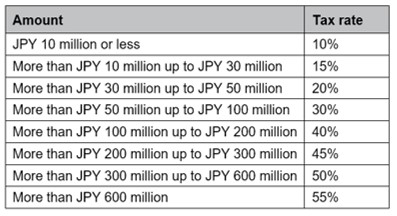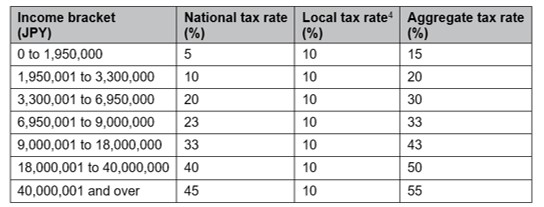Legal
Japan Wealth Management - Latest Developments

Here is an outline of important recent legal, tax and regulatory developments affecting wealth managers conducting business with or in Japan.
Here are further guides to legal, regulatory and tax developments across Asia as they affect wealth managers, private client lawyers and their clients. The overviews come from Baker McKenzie.
The authors of this item are Edwin Whatley, partner,
and Akihiro Kawasaki, senior associate. The editors are
pleased to share these views and invite responses. The usual
editorial disclaimers apply. Email tom.burroughes@wealthbriefing.com
See the previous overviews on
Singapore and
Malaysia and
Hong Kong here.
Reform of Inheritance Law
To solve issues related to inheritance, the Civil Code stipulates
basic rules, including on who will be the heir, what will be the
legacy, and how the rights and obligations of the decedent will
be succeeded. The part in the Civil Code that contains these
provisions is referred to as the "Inheritance Law (or Sozoku
Ho)."
There has been no major reform to the Inheritance Law since 1980.
Recently, the law was amended for the first time in order to
address issues related to the ageing population in Japan and
other changes in social circumstances.
The main elements of this amendment to the Inheritance Law are as
follows:
-- the new spousal residence right;
-- relaxation of the requirement to write by hand the
assets lists attached to a holographic will;
-- retention of holographic wills by the Legal Affairs
Bureau; and
-- compensation for family members who contributed to the
care or nursing of the decedent.
Spousal residence right (effective from 1 April
2020)
The spousal residence right allows the spouse of the deceased to
use a house owned by the deceased free of charge for the spouse's
entire life or for a certain period of time, if the spouse was
living in the house at the time of the death of the deceased.
Where there is more than one heir with regard to a house, the
regime enables a spouse to acquire the spousal residence right
and an heir other than the spouse to acquire onerous ownership
rights at the time of division of the estate. The spousal
residence right does not give rise to full ownership rights; the
spouse will not have a right to dispose the house or lend the
house to others at the spouse's discretion. As the value of a
spousal residence right is lower than that of a full ownership
right, the spouse may be entitled to more assets at the time of
division of the estate, ensuring the spouse's subsequent
financial stability.
Relaxation of the requirement to write by hand the assets
lists for holographic wills (effective from 13 January
2019)
Previously, for a holographic will, it was necessary for the
testator to prepare the assets list in handwriting. The assets
list may now be prepared in other ways (e.g., using a personal
computer or attaching a copy of a bankbook).
Retention of holographic wills at the Legal Affairs Bureau
(effective from 10 July 2020)
Holographic wills are often kept at home, where they may be lost,
abandoned, or rewritten. In order to prevent inheritance disputes
arising from these problems and make it easier to use holographic
wills, the Legal Affairs Bureau will be retaining holographic
wills.
Compensation for family members who contributed to the care
or nursing of the decedent (effective from 1 July 2019)
In some cases, non-heir relatives (e.g., a spouse of a child) may
have been involved in taking care of or nursing the decedent.
Before the reform of the Inheritance Law, it was not possible to
distribute inherited property to such non-heir relatives.
In order to eliminate such inequities, non-heir relatives can now
claim compensation from the heirs if the non-heir relatives
contributed to the care and nursing of the decedent free of
charge or made a special contribution to the maintenance or
increase in value of the decedent's property.
Implementation of CRS and information exchange in
Japan
Japan passed legislation giving effect to the Common Reporting
Standard (CRS) in 2015, under which certain financial
institutions operating in Japan are obliged to report certain
financial account information regarding account holders to the
Japanese tax authorities. (1) The CRS system came into effect in
Japan on 1 January 2017, and the first reports were submitted by
financial institutions by 20 April 2018.
According to an announcement from Japan's National Tax Agency
(NTA), the NTA had gathered information on 2,058,777 foreign
accounts held by Japanese residents, from 86 countries, primarily
in Asia and Europe, by the end of June 2020. The NTA had provided
information on about 473,699 accounts held in Japan to 65
countries and regions by the end of June 2020.
This compares with a paltry 10,652 filings made in 2019 in
compliance with Japan's overseas asset requirement, under which
individuals holding assets with a value of JPY 50 million or more
($462,000), including assets held in trusts, are required to
report information regarding such assets in their tax returns.
This data may be a sign that there were many assets that Japanese
residents have failed to properly declare.
It still remains to be seen precisely how the Japanese tax
authorities will use the data collected from information exchange
under the CRS during audits. The first case of criminal
accusation occurred in May 2019. In this case, the taxpayer did
not declare income tax on sales proceeds that were remitted to
the taxpayer's overseas bank accounts (as well as bank accounts
where the nominees were not the taxpayer). Although there was a
considerable amount of cash in the overseas bank accounts,
exceeding the reporting threshold of $462,000, the taxpayer
failed to submit the overseas assets report (or Kokugai Zaisan
Chosho) by the due date, without a justifiable reason. The tax
authority imposed penalties on the taxpayer for non-compliance
with the overseas assets report requirement.
Additionally, the NTA has publicly announced through its website
that it is focusing on undertaking audits of high net worth
individuals and their international transactions. Given the
consequences of non-compliance, there is clearly an incentive now
for Japanese resident persons to comply with the Japanese
overseas asset reporting requirements (and for non-residents
holding assets in Japan to comply with their local country's
asset reporting requirements).
Japanese gift and inheritance tax rules
In 2017, the Japanese inheritance tax rules were amended such
that, where a foreign national who had lived in Japan for 10
years (in the aggregate) out of the last 15 years died outside
Japan, the foreigner national's heirs would be subject to
Japanese inheritance tax on the foreign national's assets located
both in Japan and elsewhere (a similar rule also applies for gift
tax purposes).
This rule resulted in a situation where Japanese inheritance tax
may still apply to a foreign national's worldwide assets even if
the foreign national had left Japan, for up to five years after
the expatriation. The fact that Japanese inheritance tax could
"follow" a foreign national for up to five years after they left
Japan caused great concern among Japan's expatriate community and
threatened to derail the Japanese Government's efforts to attract
successful foreign talent to live and work in Japan.
In Japan's 2018 Tax Reform, the Japanese Government abolished the
above rule applying to foreign nationals (2), subject to certain
anti-avoidance measures in the context of gift tax. This change
applies to inheritance taxable events that occur on or after 1
April 2018.
Japanese exit tax (effective in 2020)
Under Japan's 2015 tax legislation, which was passed by Japan's
Diet and promulgated on 31 March 2015, a new "exit tax" came into
effect. Under the new tax regime, which applies to both
expatriating Japanese nationals and certain long-term foreign
residents, an individual subject to the exit tax must pay tax on
the deemed gain realised on the sale of assets at applicable
individual income tax rates. (3) The exit tax applies where: (a)
the individual has financial assets with a total aggregate value
of JPY 100 million or more; and (b) the individual has maintained
their place of residence or place of abode in Japan for five
years or more during the 10-year period immediately prior to
departure from Japan.
In order to determine whether the JPY 100 million threshold is
met, the law considers assets such as certain securities, as
defined under the Income Tax Law (including foreign stocks and
bonds and stock option certificates), interests held in a silent
partnership (i.e., a Tokumei Kumiai or "TK") contract, unsettled
credit transactions or when-issued transactions, and unsettled
derivatives.
With respect to foreign nationals, the five-year period does not
include time spent in Japan under a visa status specified under
Table 1 of the Immigration Control and Refugee Recognition Act
which includes work status visas, such as intra-company
transferee visas or business investor/manager visas, under which
expatriate employees are typically assigned to Japan. It will
apply to non-Japanese persons present in Japan under a visa
status specified under Table 2 of the Immigration Control and
Refugee Recognition Act, including permanent residents and
spouses of Japanese nationals.
The persons subject to the above law include those who (a) own
certain assets with a combined value of JPY 100 million at the
time of the inheritance, and (b) have had a principal place of
residence (jusho) or temporary place of residence (kyosho) in
Japan for at least five out of the last 10 years, as of the date
before the inheritance.
It should be noted that the Japanese Exit Tax and Inheritance Tax
work in tandem at the time of the death of a person, where
applicable. Specifically, where certain residents of Japan have
certain assets at the time of their passing worth JPY 100 million
or more (i.e., they are subject to the Exit Tax), and a
non-resident receives through inheritance all or some of such
assets, the assets will be deemed to have been transferred as of
the inheritance date, and the decedent will be assessed for
income tax on any built-in gain in such assets. Thus, the estate
of the decedent would be subject to Exit Tax on the expatriation,
and the recipient subject to Inheritance Tax on the same
assets.
The law was promulgated with respect to non-Japanese nationals to
apply prospectively; thus, the five-year count for foreign
nationals began in July 2015, such that the five-year period will
not come into effect until (at the earliest) July 2020, for
foreign nationals resident in Japan with a permanent resident or
similar visa status. As a practical matter, the prospect of being
taxed on capital gains on securities and similar assets has
caused a number of long-term residents to expatriate from Japan
prior to the effective date of the exit tax. Likewise, another
strategy to avoid the effect of the tax is for an expatriate
currently in Japan on a "permanent resident" or spousal visa to
relinquish such visa status and switch to a work visa.
In any event, the upcoming effective date of the law as it
applies to non-Japanese national should be considered with
respect to any Japan expatriation planning going forward and
should be considered prior to a move to Japan by either a
Japanese national or non-national.
Inheritance and gift tax rates
Inheritance and gift tax rates – scope of inheritance tax was
changed in 2021
Japanese gift tax
Japanese gift tax rates, imposed at progressive rates ranging up
to 55 per cent, have remained the same since 2018. Gift tax is
assessed on the total value of gifts received annually. For this
purpose, gifts from all donors are aggregated subject to an
annual exemption of JPY 1.1 million. Rates can be summarised as
follows.

Note that special gift tax rates apply to gifts made from lineal
ascendants including parents and grandparents to their lineal
descendants, including children or grandchildren who are 20 years
old or older as of 1 January of the year in which the gift is
made.
Japanese inheritance tax
As with gift tax, the taxpayer for inheritance taxes is the
individual who acquired property by inheritance or by
bequest.
Inheritance tax rates and available deductions in effect in 2019
are as shown in the following table:

The analysis to determine whether heirs will be subject to
inheritance tax on domestic assets, foreign assets, or both, can
be complex and, in the case of a non-national, will depend on the
length of time such person has resided in Japan. In the 2021 tax
reform, the scope of taxable assets for inheritance (or gift) tax
purposes in the case that a non-national (limited to those who
have certain visas, such as working visa, etc., but excluding
those who have a spousal visa, etc.) is an antecessor (or a
donor) is narrowed down to domestic assets in order to remove a
barrier for highly skilled non-national workers to work in Japan.
Individual income tax rates – unchanged from 2018
Japanese individual income tax rates are summarised below. Note
that a 2.1 per cent surtax is levied on the national income tax
until 2037, thus the maximum marginal rate is 55.945 per cent.
The following tax rates are applicable to the aggregate income of
the taxpayer.

Other changes
MLI has come into effect with respect to Japanese
treaties
Japan signed the Multilateral Convention to Implement Tax Treaty
Related Measures to Prevent Base Erosion and Profit Shifting
(MLI) in June 2017, and the document was ratified by Japan's Diet
on 18 May 2018. The MLI has already come into effect with respect
to 31 of Japan's bilateral tax treaties (including the UK, New
Zealand, Australia, Sweden and others) as of May 2021. Some of
the provisions to which Japan has "opted in" that are
particularly notable are Articles 12 and 13, involving permanent
establishments (PE), and Article 7, which incorporates the
principal purpose test (PPT). Where the PPT applies, taxpayers
should consider whether this will potentially affect their
entitlement to the benefits of the treaty.
Articles 12 and 13 of the MLI expand the scope of a PE to more
broadly encompass activities undertaken by a commissionaire
(toiya) and prevent taxpayers from relying on multiple specific
activity exemptions in order to avoid a PE. It remains unclear at
this time how the Japanese tax authorities will apply these
provisions in practice, and whether the tax authorities will
broaden the scope of structures that they challenge in audits.
Currently, Japan has tended to rely on transfer pricing
provisions to challenge transactions, but the Japanese tax
authorities may treat the implementation of the MLI as an
opportunity to also challenge structures from a PE perspective
going forward.
Changes to Japanese cryptocurrency rules
The Financial Action Task Force (FATF) amended the FATF
Recommendations in October 2018. As a result of the amendments,
crypto assets exchangers, custodians of crypto assets, etc. will
be required to implement anti-money laundering and countering the
financing of terrorism controls. Amendments to the Payment
Service Act were made in 1 May 2020, which takes into account
such FATF Recommendations.
The main elements of the amendments to the Payment Service
Act are as follows.
-- Characterising cryptocurrencies as "crypto assets"
rather than "virtual currencies" in light of the fact that most
crypto assets are not used as currencies and restricting
advertisements for "speculative investments" in the
cryptocurrency space.
-- Provisions concerning the in-advance notification, etc.,
have been prescribed, which pertain to applications for
registration of a crypto asset exchanger, the name of the crypto
assets to be handled by crypto asset exchangers, and changes to
the business of the crypto asset exchangers.
-- Provisions concerning the service of crypto assets
exchangers have been prescribed, such as the method for
displaying advertisements of crypto assets exchangers, prohibited
activities, provision of information to users and other measures
for ensuring user protection, and methods for managing users'
monetary and crypto assets.
-- Provisions concerning the transaction of Financial
Instruments Service Operators, etc., which engage in derivative
transactions using crypto assets and fundraising transactions in
the course of trade have been prescribed. These include the
development of business management systems, methods for
displaying advertisements, provision of information to customers,
prohibited acts, and methods for managing rights to transfer
electronic records of customers, etc., for Financial Instruments
Service Operators.
While the amendments to the Payment Service Act are not directly
related to tax, it is hoped that new tax regulations will also be
implemented with respect to cryptocurrency. For example,
currently individuals are taxed at regular individual tax rates
on gains arising from the sale of crypto assets; if more
favourable rates were implemented, this may encourage further
development in the area and promote Japan as a digital asset
"hub" in Asia.
Footnotes:
1, The Act on Special Provisions of the Income Tax Act, the
Corporation Tax Act and the Local Tax Act Incidental to
Enforcement of Tax Treaties (Act on Special Provisions).
2, Although the heirs of a foreign national who had resided in
Japan for a long term are no longer subject to inheritance tax
with respect to non-Japan situs assets after the non-resident
leaves Japan under the 2018 tax proposal, the rules do not
eliminate gift or inheritance tax in those circumstances with
respect to Japan-situs assets.
3, The specific rate at which tax will be owed depends on the tax
category of the income realised; Japan's individual income tax is
made up of several income categories, with varying rates. For
example, a capital gain arising on the transfer of listed or
non-listed stocks is generally subject to tax at a flat 15.315
per cent.
4, The local tax rate is the sum of prefectural and municipal
taxes.